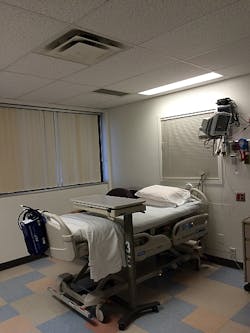Rensselaer engineering center trials smart solid-state lighting in hospital room
The Smart Lighting Engineering Research Center is working with the University of New Mexico to trial tunable lighting and its impact on human health using an LED-based system and controls in a hospital patient room.
The Smart Lighting Engineering Research Center (ERC) at Rensselaer Polytechnic Institute has announced a trial of smart LED-based lighting in conjunction with the University of New Mexico Health Center (UNMHC) in Albuquerque, NM. The solid-state lighting (SSL) project is intended to study the impact of light exposure and varied spectrum on human wellbeing.
Interested in more articles & announcements on smart lighting?
So-called human centric lighting (HCL) has been a hot and sometimes contentious topic over the past several years. Presumably, control of color spectrum, intensity, and timing of light can eliminate circadian rhythm disorders, accelerate healing, and even boost productivity in workers. But some scientists don’t believe that we have sufficient understanding about the non-visual light receptors and physiology that would underlie such benefits as we covered in an interview. Still, market research has shown a tremendous opportunity surrounding HCL.
The ERC project will be yet another opportunity to advance the understanding of the impact of light and color spectrum on humans. “At the ERC, we are building smart lighting systems that automatically adjust the right lighting for us at any given time, with light coming from the right direction, with the right color and intensity, optimized for human health and productivity,” said ERC director Robert Karlicek.
Researchers at UNMHC will conduct side-by-side studies comparing the smart LED-based lighting with legacy lighting. The team plans to study circadian disorders along with the impact of controlled lighting on depression, Parkinson’s disease, and other neurological maladies.
“Not only will this new technology allow us to study classic circadian rhythm sleep-wake disorders, but now we will be able to also investigate the effect light plays on such behavioral health disorders as depression and dementia,” said Lee Brown, M.D., professor of internal medicine and director of the UNM-HSC Sleep Disorders Program.
The customized patient room at the hospital includes a comprehensive set of sensors and controls that complement a tunable lighting system. The sensors enable precise control of intensity and spectral content and for adaptation based on natural light from windows. The ERC developed the system using products and technology from Telelumen, Heptagon, and Austria Microsystems.
“The first research study involving the specially equipped room will investigate whether individuals with delayed sleep-wake phase disorder — ‘night owls’, a condition common to college students — can be treated by varying the spectrum of light they are exposed to throughout the day,” said Brown. “Other potential research areas range from hospital-induced conditions such as post-operative delirium and ICU psychosis, to the effects of light on the sleep patterns of patients receiving chemotherapy or those suffering from depression.”
Brown speculated that in the future smart lighting might even help the medical community prevent diseases and increase productivity in healthy people. The key to such a future is concrete medical research and more widespread availability of the technology. Karlicek said, “This new ability to dynamically control the color properties of lighting is being studied in health care, education, and workplace settings to improve well-being and productivity, but there is still a lot to learn.”

Maury Wright | Editor in Chief
Maury Wright is an electronics engineer turned technology journalist, who has focused specifically on the LED & Lighting industry for the past decade. Wright first wrote for LEDs Magazine as a contractor in 2010, and took over as Editor-in-Chief in 2012. He has broad experience in technology areas ranging from microprocessors to digital media to wireless networks that he gained over 30 years in the trade press. Wright has experience running global editorial operations, such as during his tenure as worldwide editorial director of EDN Magazine, and has been instrumental in launching publication websites going back to the earliest days of the Internet. Wright has won numerous industry awards, including multiple ASBPE national awards for B2B journalism excellence, and has received finalist recognition for LEDs Magazine in the FOLIO Eddie Awards. He received a BS in electrical engineering from Auburn University.





